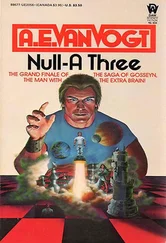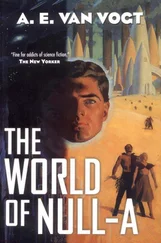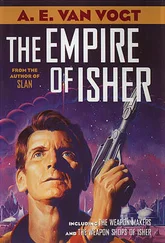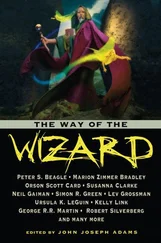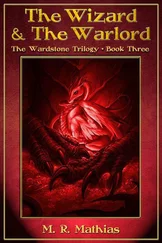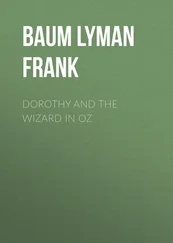It was not something that could be explained to a practical man. The whole concept of automatic machinery was as new as it was dazzling.
* * *
Zero hour was near.
It grew darker as they waited in the shelter of a mountain. Earlier, there had been desultory conversation between them, but now they were silent. From the men in the rear there came only an occasional mutter of sound.
The plan was made. The fleet had its orders. It was now only a matter of carrying out the attack itself. "Halloo-oo!"
The call floated down from the rim of the peak. Jerrin straightened, and then, stepping close, embraced his brother. The darkness hid his tears. "Good luck," he said, "and forgive me for all the things that I have done or said or thought against you."
He stepped down into the darkness, where his own soldiers waited.
The mechanism of the captured Riss-craf tfunctioned smoothly. Like a shadow, the machine rose, climbed, and flitted over the mountain top. Almost immediately, they were in the center of the battle.
The Linnan spaceships were attacking in groups of a hundred, and they came in waves. They were manned by skeleton crews, and they had two purposes: Engage if possible all the enemy's defenses by diving nose first into the torpedo-shaped invader. That was the first purpose.
It was believed the aliens would not care to have their interstellar ship rammed by hundreds of projectiles weighing thousands of tons each.
The second purpose of the attackers was for each crew to leave its ship in a small escape craf ta few moments before contact. The theory was that the air would be so filled with lifeboats that the enemy would not notice their own captured machine approaching.
Clane's energy-absorbing sphere was expected to handle any direct attacks.
The sky flashed with flame. Everywhere, Linnan spaceships were burning and falling. Clane saw no lifeboats, however, and the first sick feeling that the men were not getting away, came. There was nothing to do, however, but go ahead.
The crash of Linnan spaceships striking the metal walls of the invader was almost continuous now; and there was no longer any doubt that the enemy's defenses were not capable of coping with such a complicated attack.
Clane thought tensely: "They'll have to leave. We won't have time to get near." It was a possibility that hadn't occurred to him, earlier.
He had taken it for granted that the big ship would be able to shrug off the Linnan attack without difficulty, and without moving from its position. Instead, it was being seriously hurt.
Beside him, his commanding officer whispered, "I think I see an opening."
Clane peered where the man was pointing, and saw it, too. He felt a chill, for it was directly ahead. Unmistakably, his craf twas aiming toward it—or was being drawn toward it. It was possible that the automatic controls of his small machine had activated a door in the mother ship and that they would be able to enter without resistance. His own plan had been to force an entry with a tiny bomb, and it seemed to him he still preferred that method. The problem now was, was this a trap of those aboard, or was the process so automatic that no one paid any attention to newcomers?
It was a chance he had to take. The greatest danger was that the giant machine would start moving.
The light of the air lock proved deceptively dim. He was estimating that it was still more than a hundred feet away when there was a click. The machine slowed sharply, and he saw a blur of dully colored gray walls slide by on either side.
Doors flowed shut behind them and, in front, another set glided open. The small craf t, with its thirty-five men aboard, moved sedately forward—and was inside the ship from the stars.
* * *
At his camp headquarters, where he had taken his family for refuge, Jerrin waited.
"They're still inside." That was the terse report from his chief field officer.
After nearly eighteen hours, the reality was a virtual death sentence. Jerrin blamed himself. "I should never have allowed him to go," he told Lilidel. "It's ridiculous that a member of our family should participate in direct assaults."
He had taken part in more than a hundred direct assaults himself, but he ignored that now. He also ignored the fact that only the man who controlled the energy sphere—Clane himself—could possibly carry out the attack that the latter had outlined to him.
Jerrin paced the floor of his headquarters study; and it was several minutes before he noticed that, for once, Lilidel had nothing to say. Jerrin stared at her narrowly, realizing grimly that she and those behind her were not displeased at what had happened.
"My dear," he said finally, "Clane's failure will have repercussions on the whole state. It will mark the beginning and not the end of our troubles."
Still she said nothing. And he saw that in this crisis she was not able to comprehend the issues. She had her own purposes, the purposes of a mother and of the agent of the group that worked through her. His mind went back to the choice the old Lady Lydia, his grandmother, had made in persuading her aging husband that her son should be the heir of Linn.
"I must make sure," Jerrin decided, "that the succession is never in Lilidel's giving. It's just about time, also, that I take more interest in the children. I can no longer trust what she has done with them."
That applied particularly to Calaj, his eldest son.
He looked again at his wife, and parted his lips to tell her that, if Clane was alive, he had the power to take over the government at will. He didn't say it. It would serve no useful purpose. In the first place she wouldn't believe it, and in the second it was not completely true. Government depended partly on the
co-operation of the governed; and there were factors against Clane of which, fortunately— he was convinced—Clane himself was aware.
The meetings between them had made an amicable co-operation possible. Only an emergency, he was sure, would now alter the shape of things political in Linn.
I shall have to make a will, he thought. Ifanything happened to me, if I should die—there must be no confusion .
He felt oppressed. For a second time in less than a year, disaster had struck at the heart of the empire. First, Czinczar, the barbarian, and now the aliens. From the air he had seen the refugees streaming out of the concealing smoke of cities bombed before they were completely evacuated, and he was conscious of his inadequacy in the face of such a colossal catastrophe. It was that that decided him.
* * *
"I refuse," he said, "to believe that Clane has failed. If he has, then we are lost. And my awareness of that fact emphasizes once again his importance in a crisis. He is the only person qualified to handle a major emergency involving atomic energy. If he is still alive, I intend to do as follows."
She listened wide eyed as he explained about the will he planned to write. Abruptly, her face twisted with fury. "Why, you're mad," she breathed. "Are you serious? You're going to disinherit your own son?"
He gazed at her bleakly. "My dear," he said, "I want to make one thing clear to you and to your private army, for now and always. So long as I am the Lord Adviser, the state will not be regarded as a property which my children automatically inherit. It is too soon to decide whether Calaj has the qualities necessary for leadership. My impression of him is that he is an exceedingly emotional youth who gets his own way far too of ten. There is no sign yet of that stability which I have, which Clane has, and which even Tews had to some degree."
Читать дальше



